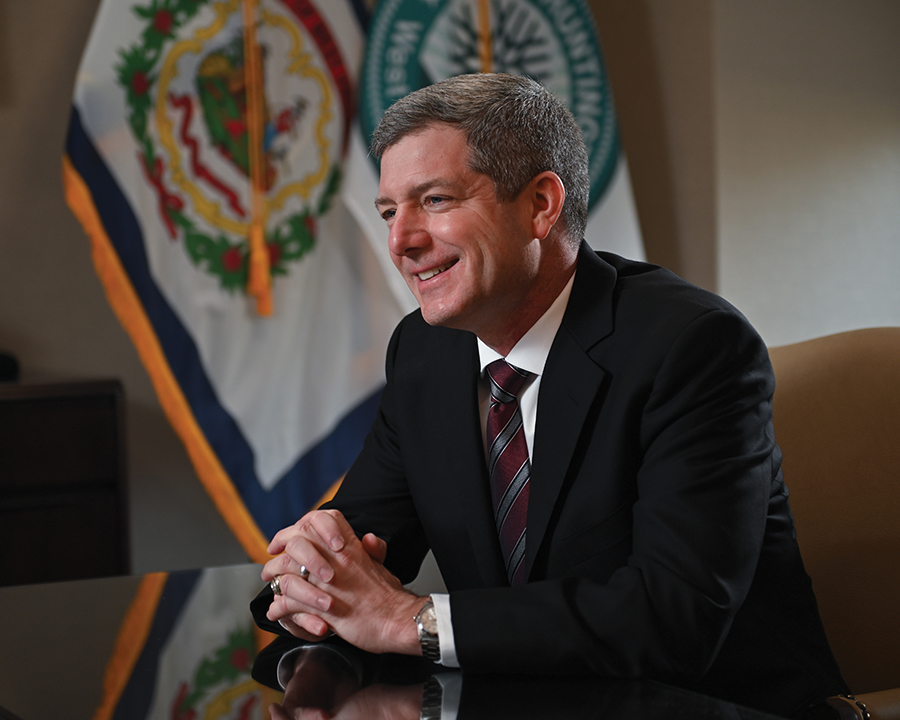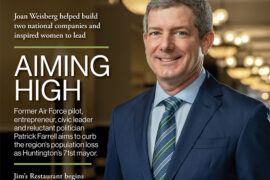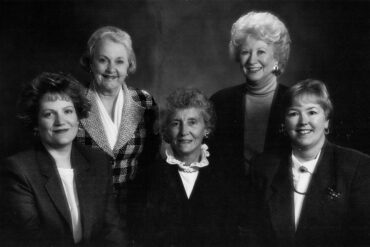Former Air Force pilot, entrepreneur, civic leader and reluctant politician Patrick Farrell begins his term as Huntington’s 71st mayor.
By Jack Houvouras
HQ 129 Spring 2025
Like most high school seniors who grow up in a small city in America, Patrick Farrell wanted to see what existed beyond the boundaries of his hometown. As a standout student at Huntington East High School, he had his pick of universities to attend, including the prestigious U.S. Military Academy at West Point. In the end, he chose the U.S. Air Force Academy because, in his own words, he wanted to “serve his country and see the world.”
Farrell was able to achieve that goal from the cockpit of an F-15E Strike Eagle during the course of nine years of active duty. In that time, he participated in numerous missions around the world including the Iraq War. But over time he came to the realization that he wanted to return to his roots and family in Huntington, and to help make a difference in the community he calls home.
Farrell grew up in Huntington’s Gallaher Village and Arlington Park neighborhoods and attended school at Our Lady of Fatima, Beverly Hills Junior High and Huntington East High School. His father Paul Farrell Sr. was an accomplished prosecuting attorney and today serves as a Cabell County circuit judge, and his mother Charlene is the former executive director of Hospice of Huntington. His older brother Paul Jr. graduated from Notre Dame and the WVU College of Law and practiced law in Huntington for years, while his younger brother Sean earned an engineering degree from Purdue and a master’s in engineering from Marshall before joining Farrell at Service Pump & Supply in Huntington.
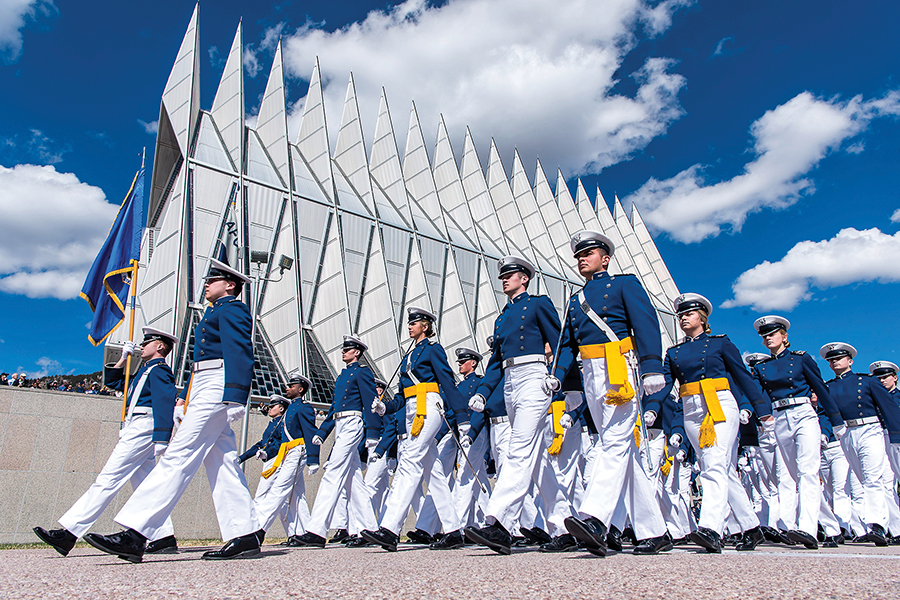
“My parents were very accomplished community leaders, but they never put any pressure on us to follow in their footsteps,” Farrell recalled. “They just set a wonderful example of what it means to give back to the community.”
Farrell said his fondest memories of growing up in Huntington include walking to school, riding his bike to Ritter Park and spending time with his family around the holidays.
“We are a big Catholic family,” he explained. “On my mom’s side are the Linsenmeyers and the Russos, and my dad has a big family as well. I have the best memories of spending Thanksgiving and Christmas with my grandparents and cousins.”
An accomplished student who served as student body president at Huntington East, Farrell was accepted to numerous colleges and universities but ultimately chose the U.S. Air Force Academy in Colorado Springs, Colorado.
“I thought being in a jet was better than being in a tank,” he said with a smile.
After Farrell graduated from the Academy in 1996, he was trained to fly an F-15E Strike Eagle, a dual-role fighter designed to perform air-to-air and air-to-ground missions. An array of avionics enables the aircraft to operate at low altitudes, at any time of day or night and in all weather conditions.
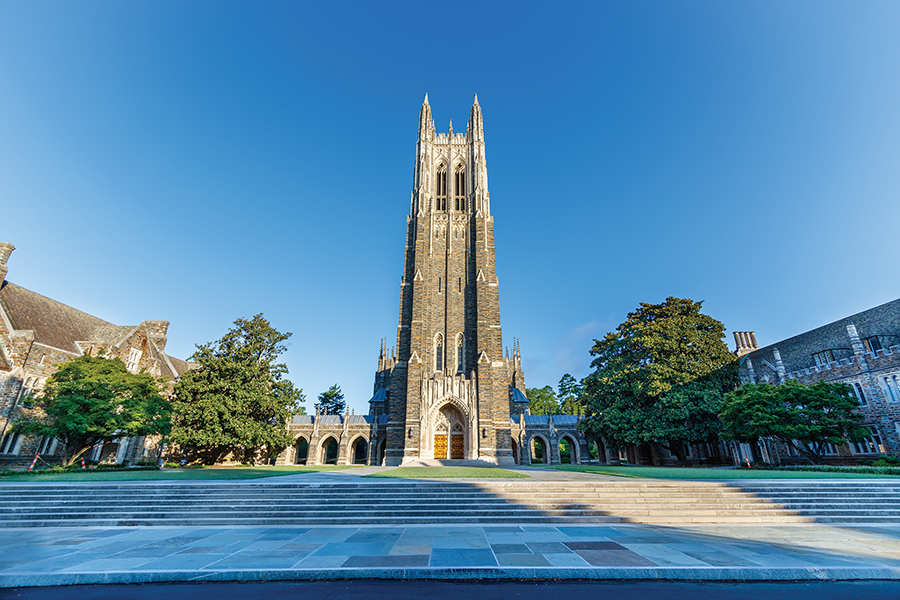
Farrell served nine years of active duty, flying missions mostly in Iraq, Kuwait and Kosovo. He was awarded the prestigious Distinguished Flying Cross in recognition of his heroism and service in Iraq.
Following his tour of duty in the Middle East, Farrell was stationed at Seymour Johnson Air Force Base outside Raleigh, North Carolina. While working there as a flight instructor, he pursued a Master of Business Administration at Duke University in his spare time.
It was during a visit home at Christmas that he met his future wife, Huntington native Kate Wolfe, who was also in town for the holidays. It turned out that she worked in Raleigh, just 60 miles from Farrell. The two began dating when they returned to North Carolina.
The year 2005 would prove to be pivotal for Farrell. He married Kate, separated from the Air Force, graduated from Duke and returned to West Virginia, accepting a job with a defense contractor in Clarksburg.
“We both decided to return to West Virginia because it was the best place to raise a family,” Farrell noted. “I did intelligence work for five years, but eventually I developed an itch to start my own business. I wanted to bet on myself, and I wanted to grow jobs here.”
The couple returned to Huntington in 2011 to be closer to their families. Shortly after, Farrell started Savage Grant, a holding company designed to invest in Appalachia through the energy, infrastructure and technology industries. He invested his own money and took on a handful of partners to help launch ventures.

Savage Grant’s first move was to found Mountain Point, a cloud technology consulting firm based in Charlotte, North Carolina. The firm helps small and medium-sized companies improve their operations using cloud-based software and artificial intelligence.
In 2014 the company acquired Service Pump & Supply, a Huntington firm founded in 1980 that offers clean water, wastewater and stormwater management solutions to businesses and municipalities throughout central Appalachia.
In 2017 Savage Grant helped launch CentralApp, a firm that connects companies nationwide with certified, affordable high-tech workers in Appalachia. The startup was promoting “remote work” three years before the COVID-19 pandemic.
With his business interests on solid ground, Farrell turned his attention to the social and economic challenges facing both the city and state.
“I thought all we needed to do to fix Huntington and West Virginia was to grow jobs,” Farrell recalled. “Then I realized that we needed more than that, so I joined the Marshall University Board of Governors in 2017. That helped me understand that education was a big piece of the puzzle. We have a ton of potential, but only if the city and the university are strong partners.”
Farrell was chair of the Board of Governors in 2021 when the university began its search for a new president. During that time and in the years that followed, he forged a strong relationship with the man selected as Marshall’s 38th president — former Intuit CEO Brad D. Smith.
“Anyone who has worked with Brad knows that he is an amazing visionary and dedicated public servant,” said Farrell. “He wants to give back to the people who gave to him. He has been able to reinvigorate and breathe new life into Marshall, and I think that in turn has breathed new life into Huntington.”
The respect between Farrell and Smith is mutual.
“Patrick Farrell exemplifies a commitment to service,” said Smith. “As a decorated U.S. Air Force veteran and successful entrepreneur, he brings a wealth of experience to our city. He possesses a deep-rooted love for our community and a vision for a thriving future.”
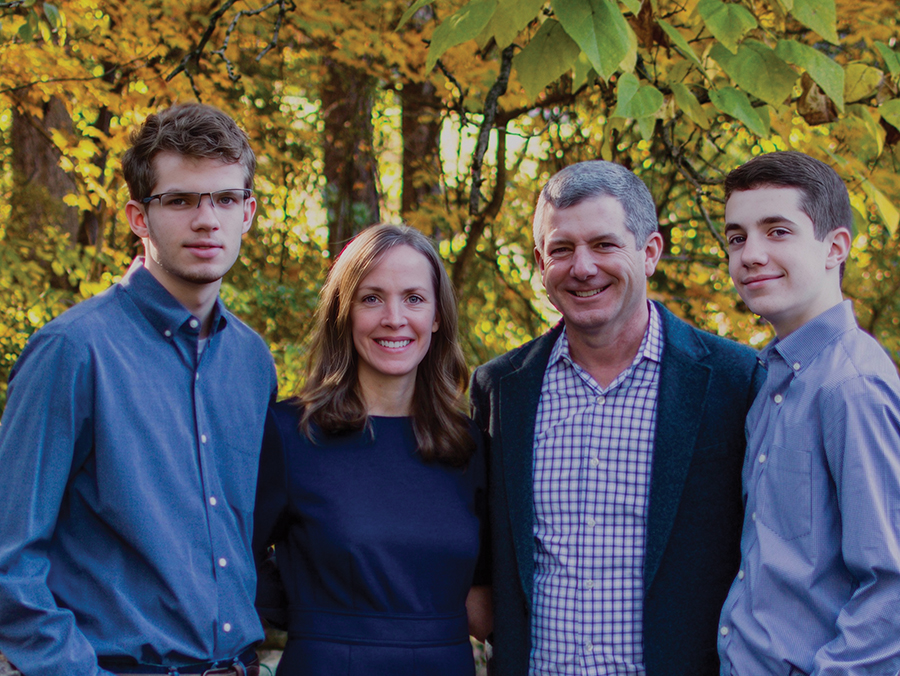
Despite the positive impact that Smith had on the community, Farrell grew frustrated by the lack of tangible progress in addressing Huntington’s challenges, including the lack of jobs, loss of population, opioid epidemic and public safety concerns. Having no political aspirations of his own, Farrell set out to find someone to run for mayor. But after speaking with at least a dozen potential candidates, he decided to throw his own hat in the ring.
“I decided to run for mayor because I couldn’t find any takers,” he recalled. “After giving my sales pitch enough times and getting shot down, I realized that if it was going to happen, I was going to have to do it myself. I could see that with the progress at Marshall, economic development announcements like Nucor Steel and the $45 million Institute for Cyber Security, all the pieces were coming together. This was a great opportunity to unlock the potential that Huntington has always had, and this was the inflection point.”
Despite being a political novice, Farrell managed to win the Republican primary and went on to win the general election by just 421 votes. He was sworn into office on Jan. 2, 2025, by his father. In his inaugural address, Farrell outlined his top priorities: combating crime, drug trafficking and homelessness while improving the city’s infrastructure — especially flood control — and strengthening economic development efforts. To achieve all this, he said his team will scrutinize and optimize the city budget.
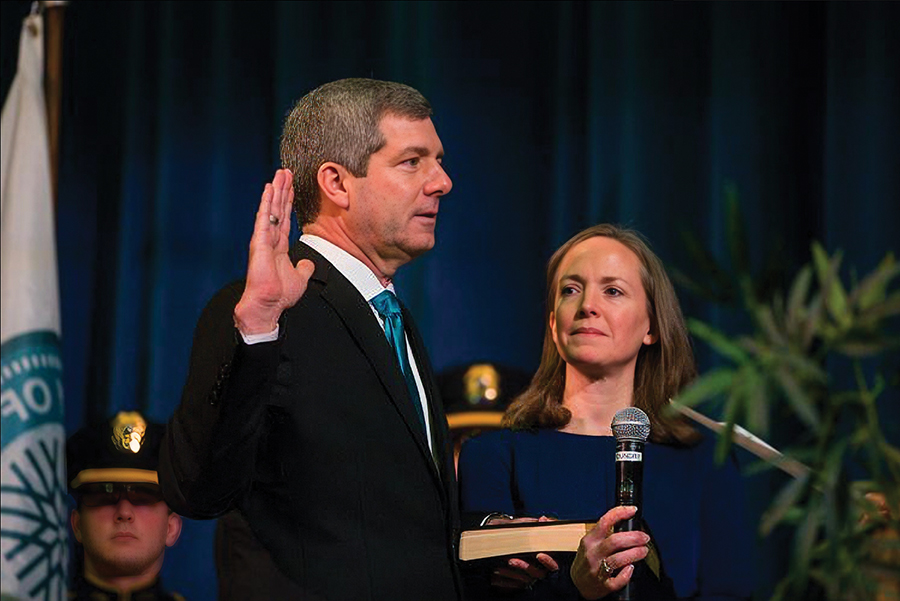
“Huntington’s population peaked in 1950 and has been on a steady decline ever since. Our greatest challenge is to diversify our economy and reverse the population decline. We must grow jobs so our children and grandchildren can call Huntington home,” he asserted.
Kathy D’Antoni, former assistant state superintendent of schools with the West Virginia Department of Education, said she grew to admire Farrell as a leader during their service together on Marshall’s Board of Governors.
“Huntington is very fortunate to have a leader of Patrick’s caliber as mayor,” D’Antoni said. “If I ever found myself in a foxhole in the middle of a battle, I would want him by my side. That is how much strength and integrity he brings.”
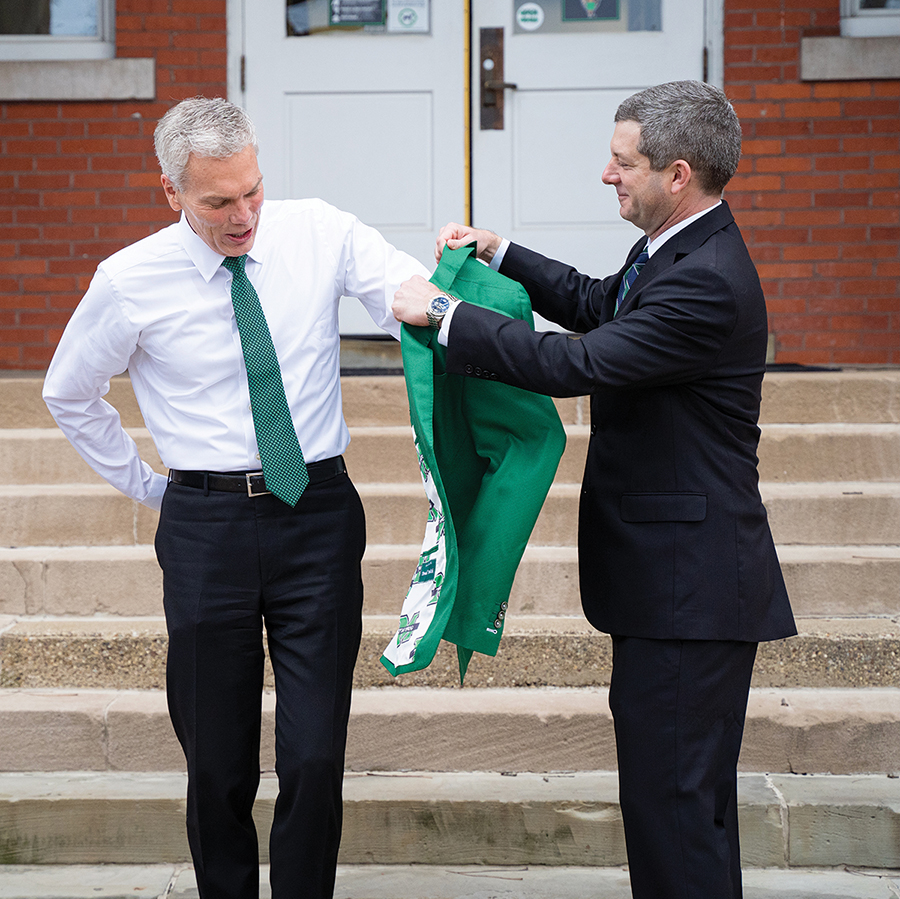
As for what has motivated Farrell to succeed in school, business, public service and now politics, he explained that it can all be traced back to one thing: family. He said his parents instilled in him a deep sense of service and commitment to his hometown — values that now guide him as mayor.
“Family is the most important thing in my life,” he said. “My parents’ love and the example they set are what made me the person I am today. I inherited their love of Huntington and public service, but their greatest gift to us was their love for each other. They showed us the value of what it means to be a family.”

